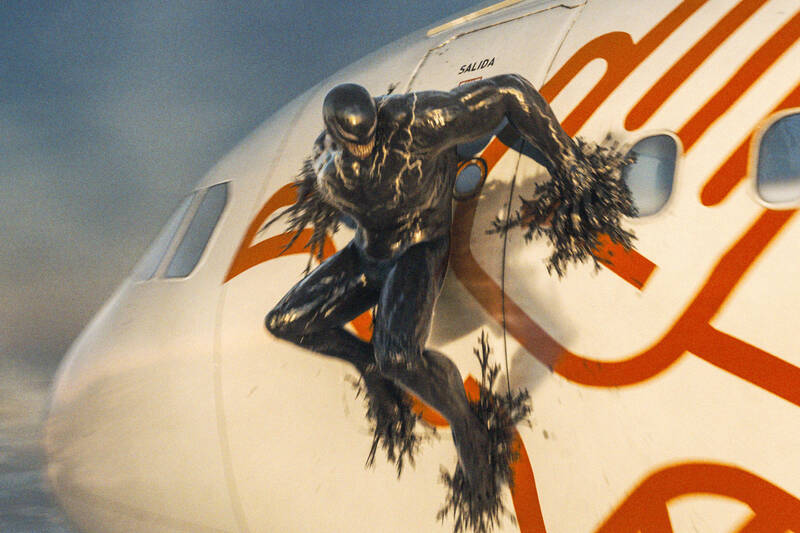For three films now, Tom Hardy has smushed Jekyll and Hyde into one strange and slimy double act. In a Marvel universe filled with alter egos that cloak stealthy superpowers, his investigative reporter Eddie Brock doesn’t transform. He shares his body with an ink-black alien symbiote (voiced with a baritone growl by Hardy), who sometimes swallows him whole, sometimes shoots a tentacle or two out and always chipperly punctuates Eddie’s inner monologue.
These have been consistently messy, almost willfully bad movies, but Hardy’s performance has been a strangely compelling one-body buddy comedy. It’s one thing to throw a cape on and jump the sky. It’s another to run manically through the desert with an alien voice inside barking, as Eddie’s inner-alien does in the new Venom: The Last Dance, “Engage your core,” “Nice horsey” and “Tequila!”
The biggest dichotomy of these movies, though, isn’t the Eddie-symbiote split. It’s the contrast between Hardy’s funny, sometimes oddly touching performance and all of the CGI mess around him. There were moments of fun in the first two movies, but if The Last Dance, currently in Taiwan theaters, is the swan song for this spun-off, half-formed franchise, it confirms that the Venom films never quite figured themselves out.

Photo: AP
In The Last Dance, Kelly Marcel, co-writer of the first two Venom films, takes over directing, following Andy Serkis (2021’s Venom: Let There Be Carnage) and Ruben Fleischer (2018’s Venom). We rejoin Venom (the fusion of Eddie and his alien-entity soulmate) in Mexico where they’re on the run from the law. But a new threat is also emerging.
The movie opens with Knull (Serkis), the symbiote creator who, from some icky distant and dark corner of space, dispatches aliens to retrieve a “codex” found within Venom’s spine that, if obtained, will lead to the annihilation of both humans and symbiotes.
To me, bringing a typical comic book-style doomsday plot is about the last thing a Venom movie needs. The best sequences in the first two movies are no more complicated than Venom craving lobster or ordering pizza. Smaller stakes better suit its warped comedy. The touchstone for these movies shouldn’t be the Marvel playbook but old episodes of The Odd Couple.

Photo: AP
Instead, we’re thrown into a pretty immediately boring Area 51 setting where an elaborate lab headed by Dr. Teddy Payne (Juno Temple) studies the symbiotes it has trapped with the help of a military division led by Rex Strickland (Chiwetel Ejiofor, lending more gravitas to the movie than it deserves). Once the alien insect things arrive seeking the codex, there’s plenty of running and fighting, with a UFO-enthusiast family in a VW bus (Rhys Ifans plays the dad) thrown into the mix. The ensuing battle ultimately, as the title promises, threatens to divide Venom for good.
But the promise of the Venom series, really, is that the mainline Marvel stuff would intrude less here. This is a B-movie realm of the multiverse with little appetite for solemnity, nobility or two-and-half-hour running times. They can feel a little like tossed-off knockoffs, which is both their appeal and their frustration.
I kept rooting for the surprisingly lifeless The Last Dance to pull way back on its save-the-world plot (and its CGI) and lean more into its most potent effect: Hardy’s split-personality double act. If this is to be a last hurrah — which, granted is a dubious idea for anything even adjacently connected to Spider-Man — it’s a shame that we never saw more of Venom in daily life. Eddie is a journalist after all. One can only imagine how he and the symbiote might have debated more pressing concerns than the fate of the universe, like Oxford commas.

Photo: AP

Most heroes are remembered for the battles they fought. Taiwan’s Black Bat Squadron is remembered for flying into Chinese airspace 838 times between 1953 and 1967, and for the 148 men whose sacrifice bought the intelligence that kept Taiwan secure. Two-thirds of the squadron died carrying out missions most people wouldn’t learn about for another 40 years. The squadron lost 15 aircraft and 148 crew members over those 14 years, making it the deadliest unit in Taiwan’s military history by casualty rate. They flew at night, often at low altitudes, straight into some of the most heavily defended airspace in Asia.

Beijing’s ironic, abusive tantrums aimed at Japan since Japanese Prime Minister Sanae Takaichi publicly stated that a Taiwan contingency would be an existential crisis for Japan, have revealed for all the world to see that the People’s Republic of China (PRC) lusts after Okinawa. We all owe Takaichi a debt of thanks for getting the PRC to make that public. The PRC and its netizens, taking their cue from the Chinese Communist Party (CCP), are presenting Okinawa by mirroring the claims about Taiwan. Official PRC propaganda organs began to wax lyrical about Okinawa’s “unsettled status” beginning last month. A Global

Taiwan’s democracy is at risk. Be very alarmed. This is not a drill. The current constitutional crisis progressed slowly, then suddenly. Political tensions, partisan hostility and emotions are all running high right when cool heads and calm negotiation are most needed. Oxford defines brinkmanship as: “The art or practice of pursuing a dangerous policy to the limits of safety before stopping, especially in politics.” It says the term comes from a quote from a 1956 Cold War interview with then-American Secretary of State John Foster Dulles, when he said: ‘The ability to get to the verge without getting into the war is

Like much in the world today, theater has experienced major disruptions over the six years since COVID-19. The pandemic, the war in Ukraine and social media have created a new normal of geopolitical and information uncertainty, and the performing arts are not immune to these effects. “Ten years ago people wanted to come to the theater to engage with important issues, but now the Internet allows them to engage with those issues powerfully and immediately,” said Faith Tan, programming director of the Esplanade in Singapore, speaking last week in Japan. “One reaction to unpredictability has been a renewed emphasis on